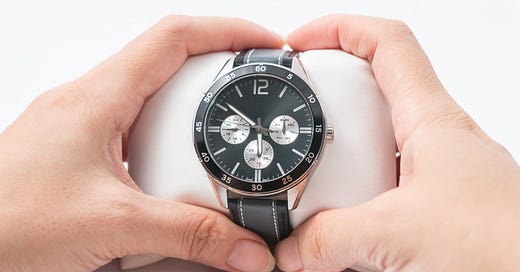The Rolex Of Sports Betting
Sports betting VIPs can account for 65-80% of bets and revenue, and the biggest bettors can be absolute game-changers. So why hasn't a book positioned itself as a luxury brand?
The Bulletin Board
VIEWS: Is Fanatics about to become the Rolex of sports betting?
BEYOND the HEADLINE: Underdog lands one of the sharpest minds in the sports betting VIP space.
LOOSE ENDS: Latest on Bally’s Chicago casino; Australia bans betting with credit cards; Alberta’s reason to regulate online gambling.
NEWS: As the gap between FanDuel and DraftKings grows, Truist declares there are no Tier 2 sportsbooks.
AROUND the WATERCOOLER: Sports betting claims another victim: A legendary Browns QB.
STRAY THOUGHTS: When it comes to gambling, culture matters.
SPONSOR’S MESSAGE - Sporttrade was borne out of the belief that the golden age of sports betting has yet to come. Combining proprietary technology, thoughtful design, and capital markets expertise, our platform endeavors to modernize sports betting for a more equitable, responsible, and accessible future.
Sporttrade’s newest feature, The Tape, prints all trades made on the app in real-time.
Is Fanatics Angling to Become the “Rolex” of Sports Betting?
VIP guru Dillon Borgida once tweeted his surprise that no one has emerged as the Rolex of sports betting.
That could be changing, considering Fanatics’ recent moves.
Fanatics has lured one of the biggest bettors in the country away from rival DraftKings. That singular bettor (according to reports) has sent Fanatics into second place overall in New Jersey.
The company also kicked the proverbial hornet’s nest in poaching DraftKings VIP executive Michael Hermalyn away from DraftKings. Its willingness to engage in the ensuing legal battle indicates how much emphasis Fanatics places on VIPs.
The latest news, hiring former Gucci senior vice president of brand and client engagement Selena Kalvaria as its new CMO, is yet another sign that Fanatics thinks it can be Borgida’s luxury sports betting brand.
As the Wall Street Journal put it, Fanatics “wants to be known as the betting app for true sports fans,” which, based on the evidence, is a euphemism for VIP bettors.
Why is Fanatics traveling down this road?
The company has made significant investments in its betting product but has struggled to carve out market share in the hyper-competitive US sports betting market. Unlike some other companies trying to beat DraftKings and FanDuel at their own game, Fanatics is, or at least appears to be, demonstrating nimbleness, assuming it is, in fact, trying to be the Rolex of sports betting.
Further reading:
Beyond the Headline: Speaking of Mr. Borgida
Regular readers will know the name Dillon Borgida, as I often quote the former VIP leader (including above).
Well, it turns out he now has a new role as a Vice President at Underdog (a newsletter sponsor) and will oversee VIP operations.
In a statement explaining his new role and why he chose Underdog, Borgida said his “primary role at Underdog will be running our VIP department,” which presents many challenges and even more opportunities to do something exciting and different.
“I have seen very little transparency from VIP teams over the recent years, and I hope to change that as much as possible,” Borgida said. “In past roles, I’ve sat in rooms with out-of-touch senior leaders whose entire focus is on strategically squeezing slot revenue out of their biggest sports fans. I’ve seen higher-margin games get shoved to the forefront as if we are blind to the real reason behind it (their own pockets).
“Don’t get me wrong, these business strategies can work in the short term, but I’m more interested in the sustainability of the industry and making sure we’re all having a good time. Underdog is, too.”
He ended with, “Let’s have some fun,” and I’m honestly very excited to see what Underdog and Borgida have in store.
SPONSOR’S MESSAGE - SUBSCRIBE NOW to Zero Latency, the new podcast from Eilers & Krejcik Gaming that provides unparalleled insight into the U.S. online gambling industry through interviews with industry insiders and analysis from EKG experts.
Loose Ends: Bally’s Chicago Casino; Australia Bans Betting with Credit Cards; Alberta’s Reason to Regulate
Chicago Mayor is unsure about Bally’s casino’s future; Bally’s isn’t: Bally’s is trying to secure funding for its permanent casino in Chicago, which has some worrying about the use of the word permanent. “I wish I could say something definitive today. I know our team is working with ownership to figure it out like we figured out some of the other things that I’ve inherited,” Chicago Mayor Brandon Johnson said. “It just has to make absolute sense. ... I think that one’s still to be determined, to be perfectly frank with you.” Bally’s has said the project is still on track.
Australia prohibits credit card betting: Australia has banned betting via credit cards, including those linked to digital wallets and digital currencies like Bitcoin. The ban was enacted on Tuesday; operators have six months to comply. “This ban builds on the significant progress to minimize gambling harm that the Albanese government has made over the past two years, which is already benefiting thousands of vulnerable Australians,” Communications Minister Michelle Rowland said. Closer to home, several US states have prohibited credit cards, and others are exploring similar bans.
A big reason for Alberta to regulate online gambling: “Approximately 55% of Alberta’s iGaming market may be in the hands of online sports betting and casino operators who are not regulated by the province,” according to Covers’ Geoff Zochodne. Per H2 Gaming Capital estimates, the government-run online gambling site accounts for just 45% of wagers, which helps explain why the province is looking to follow in Ontario’s footsteps and regulate all operators.
Analysts: Forget About Winning Tier 2; There Isn’t a Tier 2
DraftKings and FanDuel are the runaway successes in the US sports betting market, with a tightly bunched trail pack battling it out for the bronze medal.
That said, the trail pack isn’t fighting to see who is at the top of Tier 2. According to Truist analyst Barry Jonas, they are so far behind the leaders that he can’t bring himself to refer to them as Tier 2.
“Note that we skipped ‘tier two’ – we don’t think any operator in the space qualifies for that standing with white space between DKNG/FanDuel and others,” Jonas said.
While this designation is clearly for effect, it does beg the question: How do we define Tier 1, 2, and 3 operators? Let me take a quick crack at it.
Tier 3 is pretty much every operator with a market share of over 1%.
Tier 1 operators are the national industry leaders, the sportsbooks that don’t fear being overtaken by a competitor in the short term.
Tier 2 is the trickiest. I would posit that inclusion in Tier 2 requires the following qualification: A double-digit market share or at least 1/3 market share compared to the lowest Tier 1 operator.
That makes Tier 2 extremely malleable. In the current US sports betting world, there isn’t a Tier 2 operator. FanDuel and DraftKings have a combined 75% market share over the last 12 months per newsletter sponsor Eilers & Krejcik Gaming (42% and 32%, respectively). Third place belongs to BetMGM, with around 6% market share.
Sponsor’s Message - Kambi Group is the leading provider of premium sports betting technology and services, empowering operators with all the tools required to deliver world-class sports betting and entertainment experiences.
The Group’s services not only include its award-winning turnkey sportsbook but also an increasingly open platform and a range of standalone sports betting services from frontend specialists Shape Games, esports data and odds provider Abios, and AI-powered trading division Tzeract. Together, we are limitless.
Visit: www.kambi.com
Around the Watercooler
Social media conversations, rumors, and gossip.
Another sports betting victim has emerged (h/t to Jamie Salsburg for putting this on my radar).
Former Browns quarterback Bernie Kosar is suing BIGPLAY Media CEO Kendall Myles. Kosar has accused Myles “of wrongfully firing him and forcing him to place the bet that ultimately cost Kosar his radio job with the Browns last year.”
Without getting too deep into the lawsuit (you can read the full story on Cleveland.com), “The lawsuit also accused Myles and another BIGPLAY co-manager, David McAllester, of forcing Kosar to wager his own money at a charity event on New Year’s Eve 2022.”
“Part of Kosar’s contract included him placing a bet using a sports betting platform that partners with BIGPLAY at the event,” but Kosar would be betting with house money and would not be liable for losses or entitled to winnings, Cleveland.com reports.
At the event, Kosar was told he would need to personally place a $19,000 wager on the Browns to beat the Steelers. Kosar placed the bet as a “show of goodwill,” but he was later fired from his radio job with the Browns for violating NFL policy that prohibits team employees from wagering on games.
Stray Thoughts
It’s the culture stupid.
I often cite culture as one of the five pillars of legalization:
Is the culture in the state pro- or anti-gambling?
Does the state need money?
Are the existing gambling industries struggling?
Are the key stakeholders on the same page?
Is a key lawmaker championing the issue?
A recent Washington Post story examined the preponderance of gambling in the Northeast. The frenetic article took several meandering twists and turns, but it did have its moments. One of the tangents it went on highlighted the importance of culture.
From the column:
“When we compared the year a state was founded with its per-adult lottery spending, we saw the strongest relationship of any variable we considered.”
“Maybe it’s a coincidence,” Jonathan D. Cohen, author of a history of state lotteries in America, said, “but I don’t think it’s crazy to say there is a colonial history of lotteries and, lo and behold, the colonial states have the highest per capita lottery sales.”
I have a couple of other interesting tidbits from the column that I’ll post next week.








